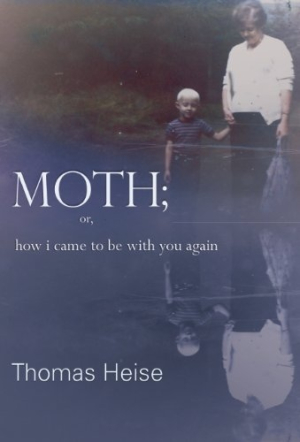Moth;
or how I came to be with you again
- 2013 INDIES Finalist
- Finalist, Literary (Adult Fiction)
Author’s mastery of language penetrates lyrical narratives of self-discovery.
Moth; or how I came to be with you again is a collection of short, lyrical narratives that lead tangentially into one another to form a poetry-prose journey of self-discovery. The narrator immerses the reader in what feels like a poetic experiment but works as a unified piece of written exploration. The speaker’s aim is to piece together a personal history by revisiting old loves, childhood images of terror and abandonment, and a constant, almost obsessive analysis of his own consciousness and place in the world.
Like most internal journeys of discovery, Moth can be self-indulgent. However, Heise’s study of memory forges something new and evocative from the familiar theme of epiphanic self-realization. With a focus on pinpointing “truth,” the speaker performs a rigorous examination of his cycles of thought and the ways in which he chooses to unconsciously reforge his memories. Readers are not only witness to the speaker’s journey but they are forced to also look inward at moments of inexplicable familiarity when the narrative seems to reflect universal self-doubt.
Following the flow of consciousness, Heise’s words mimic the act of recalling an experience and recreating what was once thought true: “As I later lay in bed struggling to recall this or other memories, the scenes would exfoliate before my eyes, peeling away to a caustic whiteness of theatre screens and leaving me with the impression that perhaps each moment had been imagined.” The prose is a study of the thought process, an unrelenting but vertiginous drive towards an undefined end point, asking where bodies take us but despairing over where minds go.
Heise’s mastery of language penetrates through the self-reflexive prose in surprising and evocative ways. He states that his “writing bore little in the way of logic and its looping and attenuated sentences swirled across the page like a butterfly with a damaged wing.” It’s visual details like these, set within meandering poetic refrains, that push the reader to rethink what was previously held as true.
In lines that speed like thought-trains across the page, Heise startles the narration with a single line that is ruthless in its exactitude: “I remember one day I began to suspect that I was a minor character in my own story after years of believing I was in the lead.” Over and over again, Heise proves that this is a book about finding yourself—and then losing what you find only to rediscover it again in new, profound, and often heartbreaking ways.
Reviewed by
Shoilee Khan
Disclosure: This article is not an endorsement, but a review. The publisher of this book provided free copies of the book to have their book reviewed by a professional reviewer. No fee was paid by the publisher for this review. Foreword Reviews only recommends books that we love. Foreword Magazine, Inc. is disclosing this in accordance with the Federal Trade Commission’s 16 CFR, Part 255.

